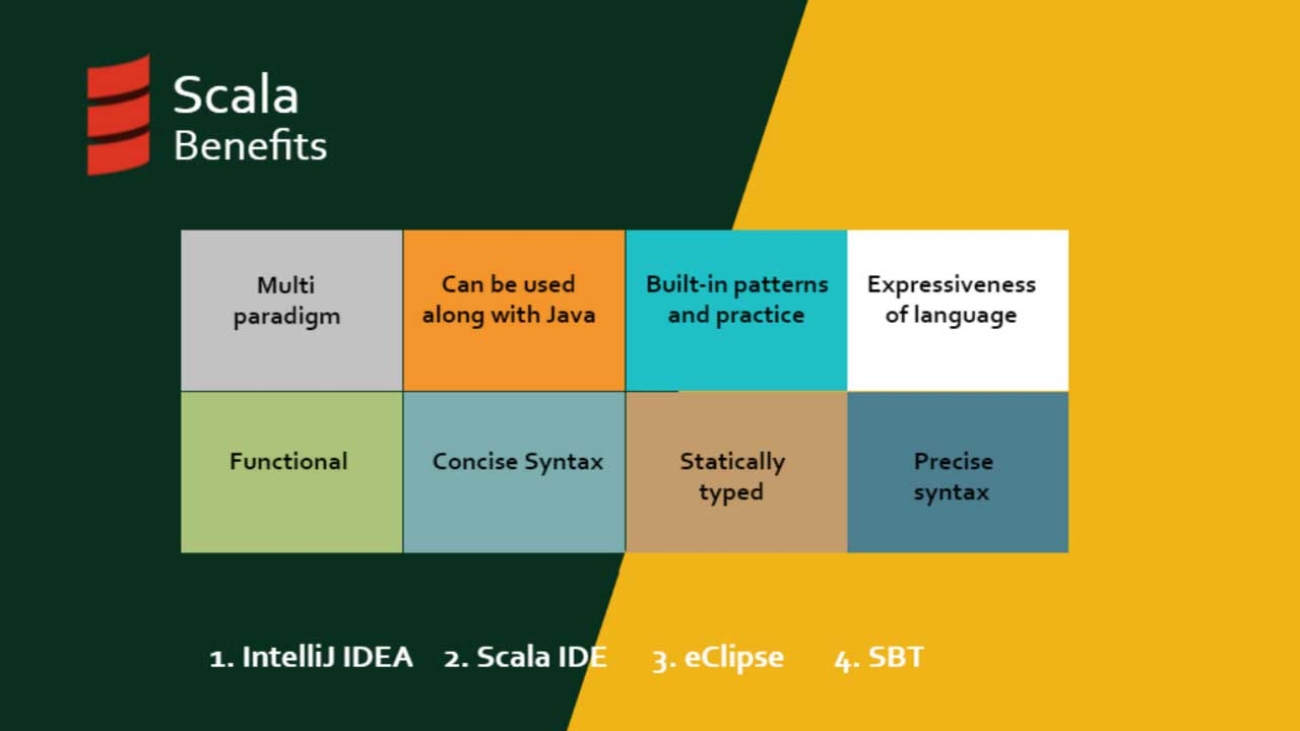Scalable Language, Scala is a general-purpose high-level programming language that combines object-oriented and functional programming in a single concise. There are many arguments and debate about this, but the major part of the arguments involves a variety of distinguished or factual shortcomings of Scala as a language. This might feel unpleasant from the outside and arise the question why should I use this? What are the benefits of to use this?
Why Scala?
It was created with purpose o being better language specifically for aspects those are considered restrictive, very tedious and frustrating for developers. The outcome is much cleaner and well-organized language which finally easy to use and productive.
What makes it special?
Scala’s complex features promote better coding and offer a performance increase. Functions, macros, and tuples are just a few of the advancements this language offers. It incorporates functional programming and object-oriented programming into a powerful language.
1. A multi-paradigm language
It enables you to explore functional and OOP features together that helps to develop imperative, logical, functional and OOP skills. You can use types associated with both data attributes and behavior attributes. Using first class functions you can pass anonymous functions along with values. That is an elegant feature of Scala and the most preferred features by developers to be popular.
2. It can be used along with Java
It is completely different language than Java, but developers does not have to reinvent the wheel. It allows compatibility and interoperability with Java. It uses the Java Virtual Machine to run. Developer can directly use code and libraries from Java into it’s class by importing Java package. Java developers can also call Scala code from their Java Code.
3. Built-in best Practice and Patterns
It was originally designed to apply modernization of programming language research to achieve mainstream traction like Java. The language itself contains number of best practices and patterns as a built-in feature. For example, val declares top-level immutability. In Java developers must declare overloaded final keyword. Read-only/const in C#. It also enables developers to create immutable classes by using case class. Closures is another feature of it’s functional programming paradigm.
4. Expressiveness of language
It is fundamentally more expressive than other language. Developers likes writing code in Scala specially when they learn this after Java.
Let us find the deference of expressiveness of this language using a small program written in Java and Scala that counts word. A single line in this where Java has taken more than 10 lines to achieve.
Code in Java:
Public class WordCount {
Public static void main(String [] args){
StringToken st= new StringToken(args[0]);
Map<String, Integer> map= new HashMap<String, Integer>();
while(st.hasMoreTokens()) {
String word= st.nextToken();
Integer count= map.get(word);
If(count == null)
map.put(word, count+1);
}
System.out.println(map);
}
}Code language: JavaScript (javascript)Code in Scala:
Object WordCountScala extends App {
Println( args(0).split(“ ”).groupBy(x => x).map(t => t._1 -> t._2.length))
}Code language: JavaScript (javascript)5. Functional, Advanced Features
Scala familiarizes functional features like:
- String comparison advancements
- Pattern matching
- Mixins, which incorporate functions in class definitions
6. Concise Syntax
It introduces new standard to be concise and readable at the same time. Scala compiler can do more than you expect. Following is a code example of same class written in Java and Scala.
Code in Java:
public class Book {
private final String name;
private final double price;
public Star(String name, double price) {
this.name = name;
this.price = price;
}
}Code language: PHP (php)You can write the same thing, using it’s case class as below:
case class Book(name: String, price: double)7. Statically Typed Language
In a dynamic language errors are visible after running the program. It provides both static and dynamic features while programmers can avoid mistakes in code before running the program. This is dynamic and strongly statically typed language. It provides type interface for variables and functions that is better than limited type interface in other language like C# and Java. It also provides a compiler that uses type reference to a full extent. There are also more differences between Scala and Java.
8. Precise Syntax
It has very precise syntax while other language like Java has long syntax. The Scala compiler called as scalac can generate and work for a better code like to String(), equals(), etc.
Summary
Using Scala developer can unexpected bugs and errors by using functional programming techniques. Writing short and expressive code that builds type-safe and performs very high helps developers to be a better engineer. Code that works better, reads better, debugs better and runs faster than before and that takes less time to write, what else you need to look for?
You can leave comments below for any help or confusion. I will try to address those as soon possible. Also, you can contact iXora Solution Scala Team for any assistance on your project implementation at Contact-iXora

Add a Comment